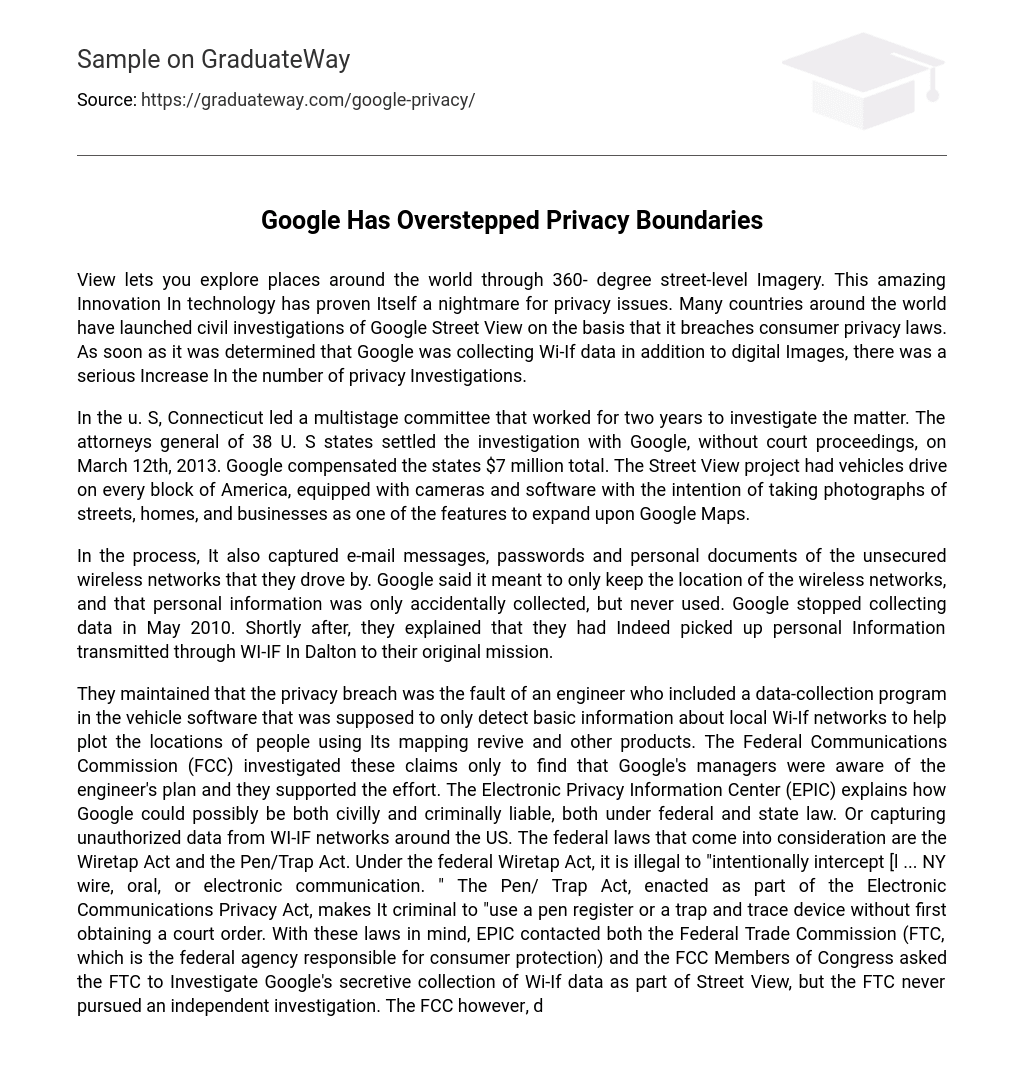View lets you explore places around the world through 360- degree street-level Imagery. This amazing Innovation In technology has proven Itself a nightmare for privacy issues. Many countries around the world have launched civil investigations of Google Street View on the basis that it breaches consumer privacy laws. As soon as it was determined that Google was collecting Wi-If data in addition to digital Images, there was a serious Increase In the number of privacy Investigations.
In the u. S, Connecticut led a multistage committee that worked for two years to investigate the matter. The attorneys general of 38 U. S states settled the investigation with Google, without court proceedings, on March 12th, 2013. Google compensated the states $7 million total. The Street View project had vehicles drive on every block of America, equipped with cameras and software with the intention of taking photographs of streets, homes, and businesses as one of the features to expand upon Google Maps.
In the process, It also captured e-mail messages, passwords and personal documents of the unsecured wireless networks that they drove by. Google said it meant to only keep the location of the wireless networks, and that personal information was only accidentally collected, but never used. Google stopped collecting data in May 2010. Shortly after, they explained that they had Indeed picked up personal Information transmitted through WI-IF In Dalton to their original mission.
They maintained that the privacy breach was the fault of an engineer who included a data-collection program in the vehicle software that was supposed to only detect basic information about local Wi-If networks to help plot the locations of people using Its mapping revive and other products. The Federal Communications Commission (FCC) investigated these claims only to find that Google’s managers were aware of the engineer’s plan and they supported the effort. The Electronic Privacy Information Center (EPIC) explains how Google could possibly be both civilly and criminally liable, both under federal and state law. Or capturing unauthorized data from WI-IF networks around the US. The federal laws that come into consideration are the Wiretap Act and the Pen/Trap Act. Under the federal Wiretap Act, it is illegal to “intentionally intercept [l … NY wire, oral, or electronic communication. ” The Pen/ Trap Act, enacted as part of the Electronic Communications Privacy Act, makes It criminal to “use a pen register or a trap and trace device without first obtaining a court order. With these laws in mind, EPIC contacted both the Federal Trade Commission (FTC, which is the federal agency responsible for consumer protection) and the FCC Members of Congress asked the FTC to Investigate Google’s secretive collection of Wi-If data as part of Street View, but the FTC never pursued an independent investigation. The FCC however, did open an investigation in Google’s OFF “obstruction”. Connecticut Attorney General Richard Blumenthal decided to pursue the case further. The Attorney General’s office opened an investigation of the data that Google collected from private networks.
Blumenthal issued a “civil investigative demand,” similar to a subpoena, for access to the data Google’s Street View cars collected from homes and businesses in Connecticut. A total of 38 states eventually participated in the investigation. The attorneys general based their suit on individual states’ consumer protection laws (which was why not all states participated). Specifically, they looked at the Electronic Communications Privacy Act of 1986, which is supposed to protect Americans’ phone calls and personal messages from being monitored without warrants and subpoenas.
However, this law was written in a completely different era when technological privacy breaches such as this were not feasible. This means that it would only offer partial protection against what technology is capable of today. At the exponential rate that technology is growing, lawmakers have not been able to keep up with privacy issues. Some federal officials cited weaknesses in the federal away and decided that they could not bring a case against Google’s collection of information about wireless networks.
Google has said, “We work hard to get privacy right at Google. But in this case we didn’t, which is why we quickly tightened up our systems to address the issue. The project leaders never wanted this data, and didn’t use it or even look at it. We’re pleased to have worked with Connecticut Attorney General George Spend and the other state attorneys general to reach this agreement. ” Eventually, Google agreed to settlement discussions and admitted that the data it elected included private information transmitted by Wi-If users.
Settlement negotiations began in January 2011 and Just recently came to a conclusion, with Google paying up. In addition, Google has to conduct an employee training program on protecting consumer information, and run a national advertising campaign on the topic. Time and time again, Google has overstepped privacy boundaries and apologizes for doing so. The fees they incur, like the $7 million settlement does nothing to set them back financially, as it is but a small pebble in their yearly expected earnings. It does, over, result in a souring view of Google’s portrayal in consumer’s eyes.





